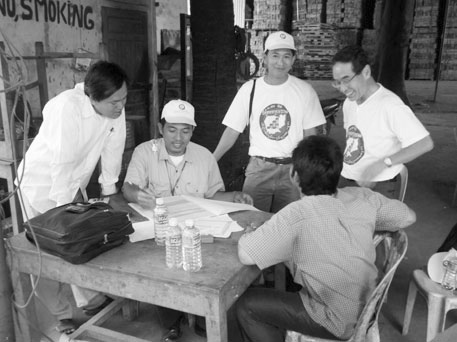As part of its assistance for policy formulation and institution building, Japan promotes assistance for legal and judicial system development. Legal and judicial system development serves to develop countries through self-help efforts that are based on good governance. Support for this sector is a typical example of person-to-person cooperation, and plays a part in Japanese assistance with a visible face. Furthermore, the development of the legal and judicial systems of developing countries will also contribute to facilitating the activities of Japanese companies. Thus, it has a vital role in laying the groundwork for promoting overseas infrastructure development with a view to realizing the New Growth Strategy issued in June 2010 (Note 21). Japan’s assistance for developing legal and judicial systems is assistance that comes through its ”soft power,” and plays an important role in underpinning the strengthening of Asia’s growth potential.
Japan also carries out a variety of efforts to assist with establishing democracy, including institution building such as for legal, judicial, administrative, civil service, and police systems. Other efforts include support for strengthening organizations, electoral assistance, strengthening civil society, and support for empowering women. An international training course on the criminal justice response to corruption was held in October and November 2010 at the United Nations Asia and Far East Institute for the Prevention of Crime and the Treatment of Offenders (UNAFEI), inviting professionals on criminal justice affairs from 16 developing countries in Asia and the Pacific. Moreover, a seminar on the protection of witnesses and whistle-blowers took place in December, with professionals from 8 South Asian countries as the primary target. There are also training programs and seminars on a variety of criminal judicial issues in line with the needs of participating countries and priority policies of the United Nations, such as measures for victims of crime, prevention of recidivism and reintegration of offenders into society, and deprivation of crime proceeds. It also provides support to combat corruption, and to improve statistical competence and local administration capacity. Moreover, Japan has extended policy formulation and institution building assistance not only to specific projects, but to financing developing countries’ national accounts.
In the area of improving the capability of police agencies that constitute a cornerstone in maintaining domestic order, Japan has been transferring the knowledge, experience, and technology of the Japanese police while also developing facilities and providing equipment. The National Police Agency dispatches experts to and accepts trainees mainly from Asian countries such as Indonesia and the Philippines, through which the Agency attempts to transfer the trustworthy attitude of democratically controlled Japanese police and its techniques regarding inspections and crime identification.

